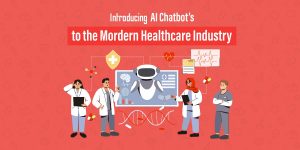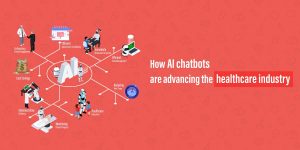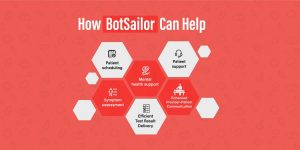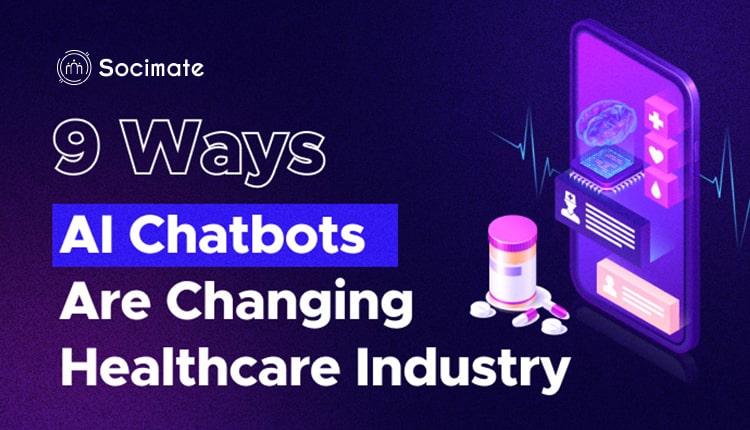9 Ways AI Chatbots Are Changing Healthcare Industry
In the ever-changing landscape of healthcare, AI chatbots have emerged as a progressive force. They are revolutionizing the way hospitals and healthcare institutions operate, offering many benefits that extend from patient engagement to administrative efficiency.
If we go back to old times, if a person had the normal flu, they would typically rely on natural remedies such as herbal teas and rest to recover. Medical knowledge was limited, and people often turned to traditional practices like steam inhalation or herbal poultices to alleviate symptoms. It was a time when the understanding of viruses and the development of vaccines were yet to be discovered.
So people used to mistreat a patient many times. In some cases, individuals would resort to bloodshed or other harmful practices in an attempt to rid their bodies of the flu. These misguided treatments often prolong the illness and could even lead to further complications.
It wasn’t until advancements in medical science that a better understanding of viruses and effective treatments, such as antiviral medications and vaccines, became available.
Thanks to modern medical and scientific advancements, people now have access to safe and effective treatments for the flu and many other diseases.
In this blog, we will discuss how AI Chatbots are changing the healthcare industry. So let’s dive in:
Introducing AI Chatbot’s to the Modern Healthcare Industry

Implementing AI technology in healthcare has further improved the diagnosis and treatment of the flu. Not only flu, AI algorithms can analyze vast amounts of data to identify patterns and predict the severity of any human illness, helping doctors make more accurate decisions.
Chatbots like BotSailor can bring this technology to the fingertips of the patients, allowing them to provide immediate guidance and support for their flu symptoms or any other diseases that they might suffer from.
Additionally, BotSailor is very time-saving for professionals in the healthcare field since it can automate all of a medical representative’s normal and lower-level duties.
However, it isn’t the case. It collect and store patient information, assure its encryption, enable patient monitoring, provide a range of educational support, and provide more extensive medical assistance.
The rate of adoption will increase further as more businesses become aware of the benefits of automating their processes with chatbots.
It is projected that the market for healthcare chatbots would reach $944.65 million by 2032, up from $230.28 million in 2023.
There are two categories of AI chatbots that are being used in the hospital industry: Informational chatbots and Diagnostic and symptom checker chatbots.
- Informational chatbot: An informational chatbot in the medical sector is an AI-powered virtual assistant designed specifically to assist users with medical-related inquiries and tasks. These chatbots use artificial intelligence and natural language processing to understand and respond to users’ questions about symptoms, medical conditions, treatment options, and general healthcare information.
- Diagnostic and symptom checker chatbot: On the other hand a diagnostic chatbot use artificial intelligence and medical databases to offer users an initial evaluation of their health concerns. Users typically describe their symptoms to the chatbot, which then generates potential diagnoses, offers general advice, and may recommend seeking professional medical guidance.
How AI chatbots are advancing the healthcare industry:

AI chatbots are significantly advancing the healthcare industry by enhancing patient care and administrative efficiency. These intelligent bots provide immediate responses to patient queries, offer appointment scheduling and reminders, and even assist in preliminary diagnosis.
By automating routine tasks, they free up healthcare professionals to focus on more complex medical tasks. Moreover, AI chatbots can collect and analyze patient data, helping hospitals make data-driven decisions, simplify operations, and improve patient outcomes.
They contribute to cost savings, increased patient satisfaction, and a more efficient healthcare system overall.
- Enhancing Patient Engagement
Patient engagement is a critical factor in healthcare. It leads to better health outcomes and patient satisfaction. AI chatbots are playing an important role in improving patient engagement by providing instant responses to patient inquiries.
Patients can access information about their health conditions, treatment options, and appointment scheduling any time.
This accessibility empowers patients to take charge of their health, resulting in a more informed and engaged patient population.
- Efficient Appointment Scheduling
One of the primary challenges hospitals face is managing appointment schedules efficiently. AI chatbots automate appointment scheduling, reducing the administrative burden on hospital staff.
Patients can book, reschedule, or cancel appointments simply through ai chatbots, eliminating the need for lengthy phone calls and reducing scheduling errors.
- Immediate Responses to Queries
Patients often have questions about their health or ongoing treatments that require quick answers.
AI chatbots excel in providing immediate responses to common queries, such as medication instructions, lab results, and post-operative care.
This reduces patient anxiety and ensures they receive the information they need promptly.
- Efficient Data Management
Managing patient data is a fundamental aspect of healthcare operations. AI chatbots can efficiently handle and process vast amounts of patient data, ensuring that information is readily available to healthcare professionals when needed.
This contributes to faster decision-making and improved patient care.
- Reducing Wait Times
Long wait times in healthcare facilities can lead to patient frustration and dissatisfaction. AI chatbots help in minimizing these wait times by simplifying patient check-ins and providing real-time updates on appointment delays or changes.
Patients can arrive at the hospital precisely when they are needed, reducing overcrowding in waiting areas.
- Healthcare Education
Chatbots are valuable tools for disseminating crucial medical information. They can educate patients about various health conditions, treatment options, and preventive measures.
This empowers patients to make informed decisions about their health and encourages healthier lifestyles.
- Monitoring Patient Progress
AI chatbots can follow up with patients post-discharge, ensuring that they are adhering to their treatment plans and medications.
This proactive approach to patient care can help prevent readmissions and improve overall patient outcomes.
- Administrative Efficiency
Beyond patient care, AI chatbots simplify administrative processes within hospitals. They can assist with billing inquiries, insurance claims processing, and even human resources tasks such as employee onboarding.
This frees up hospital staff to focus on more complex and specialized tasks.
- Cost Savings
Implementing AI chatbots in healthcare can result in significant cost savings. By automating routine tasks, hospitals can reduce the need for additional administrative staff, lower operational costs, and enhance revenue generation through improved patient engagement and follow-up care.
How BotSailor Can Help:

Botsailor is a chatbot platform that can be used to improve communication and efficiency by using its powerful bot flowbuilder in the healthcare industry. Here are some of the ways that Botsailor can be used in healthcare:
- Patient scheduling: Botsailor can be used to schedule appointments for patients, which can free up staff to focus on other tasks.
- Patient support: Botsailor can be used to provide patient support, such as answering questions about medications, insurance, or billing.
- Symptom assessment: Botsailor can be used to assess patients’ symptoms and provide recommendations for care.
- Mental health support: Botsailor can be used to provide mental health support to patients, such as offering coping mechanisms or connecting them with a therapist.
- Enhanced Provider-Patient Communication: BotSailor serves as a valuable tool to enhance communication between healthcare providers and patients.
- Efficient Test Result Delivery: For instance, it streamlines the process of sending test results to patients and promptly addresses their questions regarding upcoming medical procedures.
Conclusion
In conclusion, BotSailor, as an AI chatbot, it excels at enhancing patient engagement, driving administrative efficiency, and ultimately elevating the quality of healthcare services.
These intelligent chatbots are not just a passing trend; they have become an essential part of modern healthcare, helping in a brighter and more efficient future for both patients and healthcare providers.
As AI technology continues to advance, the role of chatbots like BotSailor in the healthcare sector is assured for expansion. Their capacity to offer immediate support, simplifying hospital operations, and reduce costs positions them as invaluable assets to hospitals.
This ensures that patients receive the highest level of care in an increasingly complicated and demanding healthcare scenario.

